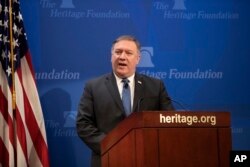French Foreign Minister Jean-Yves Le Drian said Wednesday if the United States imposed new tough sanctions on Iran, it risks further destabilizing the Middle East.
U.S. Secretary of State Mike Pompeo threatened earlier this week to apply "unprecedented financial pressure" on Iran if it does not change its behavior, as he laid out a 12-point list of demands for a new nuclear deal.
Le Drian told France Inter radio that levying new sanctions will not foster dialogue, but would instead bolster Iran's conservatives while weakening President Hassan Rouhani.
"This posture risks endangering the region more," he said.
In addition to focusing on Iran's nuclear program and its activities in the region, Pompeo has also vowed to bring home American hostages in Iran.
He said Tuesday "the entire United States government" is working "diligently" and is utilizing "every avenue" and "mechanism."
"I mentioned a handful of names yesterday. There are more around the world I didn't identify in yesterday's remarks," said the chief American diplomat during his first appearance at the State Department briefing.
In his first major foreign policy address on Monday, Pompeo said Iran has failed to free American detainees, including Baquer Namazi, Siamak Namazi, Xiyue Wang and Bob Levinson, even during a time when Washington gave Tehran sanction relief under the 2015 nuclear deal.
Pompeo drew a comparison with the United States’ "frosty relations" with North Korea a few months ago where three American detainees were later released.
"We are working diligently along every avenue that we can develop to get these folks to return back home, back to their families," he said, responding to a question posed by VOA.
Families of several American hostages are worried that the U.S. decision to withdraw from the Iran nuclear deal would make it harder to get their loved ones home safely.
On May 8, U.S. President Donald Trump announced Washington would withdraw from the Iran nuclear deal, formally known as the Joint Comprehensive Plan of Action. Under terms of the 2015 accord, Iran agreed to take a number of steps to limit its nuclear program, in exchange for sanctions relief.
France and the other signatories to the deal -- Britain, China, Russia and Germany -- have expressed a desire to keep the existing agreement in place.
The United States has been calling for an immediate and unconditional release of Americans detained or missing in Iran.
One of them is Namazi, who is 81 years old and said to be in poor health.
"We have been alarmed for some time at his declining health. We know that he’s in urgent need of sustained medical care," State Department spokesperson Heather Nauert said in February. She added that Washington also renewed its call that Tehran release Baquer Namazi’s son, Siamak Namazi, who is also being held.
In August 2016, Wang, a naturalized American citizen from China, was arrested in Iran while researching Persian history for his doctoral thesis at Princeton University. He was sentenced for 10 years on espionage charge.
Levinson is a former FBI agent who has been missing in Iran for more than a decade.
Iranian officials said they could be open to discussing the prisoner release if the U.S. changed its hostile approach and engaged with Iran in a respectful way.





